Hadith No. 2: Part 1 - Islām, Īmān & Ihsān: Hadith of Jibrīl Explained
عَنْ عُمرَ بن الخَطَّاب رضِيَ الله عنهُ، قالَ: بَينَمَا نَحْنُ عِندَ رَسولِ اللهِ - صلى الله عليه وسلم - ذَاتَ يَومٍ، إذْ طَلَعَ علينَا رَجُلٌ شَدِيدُ بَياضِ الثِّياب، شَدِيدُ سَوادِ الشَّعْرِ، لا يُرىَ عليهِ أثَرُ السَّفَر، ولا يَعرِفُهُ مِنَّا أحدٌ، حتَّى جَلَسً إلى النَّبيِّ - صلى الله عليه وسلم -، فأسنَدَ رُكْبَتَيهِ إلى رُكْبَتَيهِ، ووَضَعَ كَفَّيهِ على فَخِذيهِ، وقالَ: يا مُحَمَّدُ، أخبِرنِي عَنِ الإِسلامِ.
فقال رَسولُ اللهِ - صلى الله عليه وسلم -: "الإِسلامُ: أنْ تَشْهَدَ أنْ لا إلهَ إلَّا الله، وأنَّ محمَّدًا رسولُ اللهِ، وتُقيمَ الصَّلاةَ، وتُؤْتِيِ الزَّكاةَ، وتَصومَ رمضَانَ، وتَحُجَّ البَيتَ إنِ استَطَعتَ إليهِ سَبيلًا". قال: صَدَقت، قال: فَعَجِبنا لَهُ يسأْلُهُ ويصدِّقُهُ.
قال: فأخْبرني عَنِ الإيمان. قالَ: "أنْ تُؤمِنَ باللهِ، وملائِكَته وكُتُبِه، ورُسُله، واليَومَ الآخِرِ، وتُؤْمِنَ بالقَدرِ خَيرِهِ وشَرِّهِ". قالَ: صَدَقتَ.
قالَ: فأخْبِرنِي عن الإِحْسَانِ، قال: "أنْ تَعبُدَ الله كَأَنَّكَ تَراهُ، فإنْ لَمْ تَكُنْ تَراهُ. فإنَّهُ يَراكَ.
قالَ: فأخبِرنِي عَنِ السَّاعَةِ؟.
قالَ: "مَا المَسؤُولُ عَنْهَا بأعلَمَ مِنَ السَّائِل".
قالَ: فأخبِرني عَنْ أمارَتِها؟.
قالَ: "أنْ تَلِد الأمَةُ رَبَّتَها، وأَنْ تَرى الحُفاةَ العُراةَ العَالةَ رِعَاءَ الشَّاءِ يَتطاوَلونَ فِي البُنيانِ".
ثُمَّ انْطَلَقَ، فلبثْتُ مَليًّا، ثمَّ قالَ لي: "يا عُمَرُ، أتَدرِي مَنِ السَّائل؟ ".
قُلتُ: الله ورَسولُهُ أعلَمُ.
قالَ: "فإنَّهُ جِبريلُ أتاكُم يُعَلِّمُكُم دِينَكُم".
رواهُ مُسلِم .
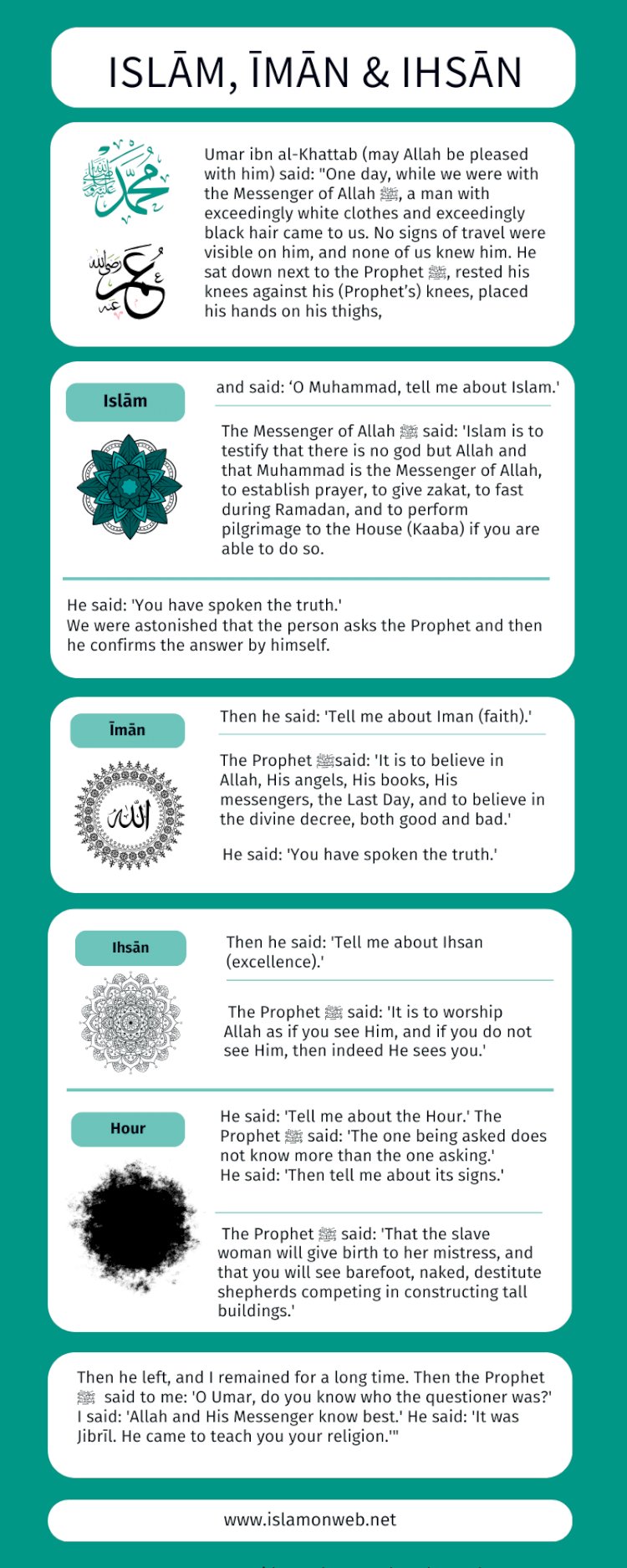
We have already covered about the narrator of this hadith in the first hadith itself.
Key terms of this hadith: Islam, Iman, Ihsan, Al-Saah
Importance of this hadith
This hadith is often referred to as the Hadith of Jibril (Gabriel) and is considered one of the foundational texts for understanding the core aspects of Islam. Ibn Hajar Al-Haythami emphasises the immense importance and comprehensive nature of the Hadith of Jibril, considering it to be of paramount significance in Islamic teachings. He states that this hadith is universally recognised for its profound impact and the extensive scope of its rulings, as it encompasses all aspects of worship, both outward and inward. It addresses the fundamental tenets of faith, physical actions, sincerity of the inner self, and the prevention of flaws in deeds.
He compares it to the first chapter of the Quran, Al-Fatihah, which is called "The Mother of the Quran" because it encapsulates the main themes of the Quran. Similarly, the Hadith of Jibril can be termed "The Mother of the Sunnah" due to its inclusion of the essential principles and comprehensive nature.
Furthermore, Ibn Hajar suggests that if this hadith were the only one present in the "Forty Hadith" collection, or even in the entire body of Sunnah, it would suffice to convey the core rulings of Sharia. This is because it succinctly covers the comprehensive framework of Islamic law, both explicitly and implicitly. The hadith serves as a foundational reference for understanding various aspects of the religion, including Islam, Iman, Ihsan, sincerity, and mindfulness.
The key aspects of this hadith include the following:
Comprehensive Summary of Islam: The hadith provides a succinct summary of Islam's core aspects: the Five Pillars of Islam, the Six Articles of Faith, and the concept of Ihsan. It serves as a foundational text that outlines the essential beliefs and practices required of Muslims.
Educational Methodology: The manner in which the hadith is presented, with the angel Gabriel asking questions and the Prophet Muhammad (peace and blessings be upon him) providing answers, demonstrates an effective method of teaching and learning and the manners to be followed while seeking knowledge.
Integration of Islam, Iman, and Ihsan: The hadith integrates the physical aspects of worship (Islam), the internal beliefs (Iman), and the spiritual excellence (Ihsan). This holistic approach underscores that Islam is not just about external actions but also about inner faith and spiritual consciousness.
Esoteric Knowledge: The mention of signs of the Hour (end times) introduces Muslims to the concept of eschatology in Islam, encouraging them to be mindful of the transient nature of the world and the importance of preparing for the Hereafter.
Emphasis on Divine Awareness: The explanation of Ihsan as worshipping Allah as if one sees Him, and being aware that He always sees us, fosters a deep sense of God-consciousness (Taqwa). This encourages Muslims to maintain sincerity and excellence in their worship and daily conduct.
Detailed Explanation
The hadith outlines the three fundamental dimensions of the religion: Islam, Iman, and Ihsan. It also discusses the Hour and its signs.
Islam: The Outward Actions
The word "Islam" comes from the Arabic root "س-ل-م" (S-L-M), which means submission, surrender, and peace. In a linguistic sense, Islam signifies submission to the will of Allah and achieving peace through obedience to Him. In the technical or religious context, as explained by Ibn Hajar Al-Haythami, Islam refers to the outward acts of worship and the practice of the five pillars. These pillars include:
- Shahada (Testimony of Faith): Declaring that there is no god but Allah and Muhammad is His Messenger.
- Salah (Prayer): Performing the five daily prayers.
- Zakat (Almsgiving): Giving a portion of one’s wealth to those in need.
- Sawm (Fasting): Fasting during the month of Ramadan.
- Hajj (Pilgrimage): Performing the pilgrimage to Mecca if one is able.
These are the fundamental pillars of Islam. Collectively, they are called acts of worship or Ibadat. In this hadith, the Prophet Muhammad (peace be upon him) explained the concept of Islam by detailing the outward acts of worship performed through speech and physical actions. These acts form the foundational practices upon which Islam is built.
Ibn Rajab Al-Hanbali, in "Jami’ al-Ulum wa al-Hikam," elaborates on the wisdom behind each of these pillars. He explains that they encompass three types of actions.
- Bodily Actions: Such as Salah (prayer) and Sawm (fasting).
- Financial Actions: Such as Zakat (almsgiving).
- Combined Actions: Such as Hajj, which requires both physical effort and financial expenditure, especially for those living far from Mecca.
But in its complete sense, all actions and practices that Allah and his Messenger have taught are part of Islam.
In a narration by Ibn Hibban, additional acts are mentioned, including performing Umrah (lesser pilgrimage), taking a ritual bath (ghusl) after major impurity, and completing ablution (wudu) thoroughly. This highlights that all obligatory outward acts fall under the definition of Islam.
The Prophet (peace be upon him) emphasised that all external actions are encompassed within the term "Islam," as shown in his saying:
"A Muslim is the one, from whose tongue and hand, the Muslims are safe." (Narrated by Bukhari and Muslim)
This indicates that the outward conduct of a Muslim, including speech and actions, is integral to their Islamic identity.
In another hadith recorded in Sahih Bukhari and Sahih Muslim, Abdullah ibn Amr reported that a man asked the Prophet, "Which Islam is best?" The Prophet replied:
"To feed the hungry and to greet those you know and those you do not know."
In a hadith from Sahih al-Hakim, Abu Huraira reported that the Prophet (peace be upon him) said:
"Islam has milestones and road markers, like the road has markers. From these are: that you worship Allah and do not associate anything with Him, establish the prayer, give zakat, fast Ramadan, enjoin good and forbid evil, greet the people when you meet them, and greet your family when you enter your home. Whoever neglects any of these, he has left a part of Islam behind, and whoever abandons all of them, he has cast Islam behind his back."
These narrations collectively demonstrate that Islam is not only about the foundational acts of worship but also encompasses all outward actions that define a Muslim’s conduct and interaction with others.
Iman: The Inward Belief
The term "Iman" is derived from the Arabic root "أ-م-ن" (A-M-N), which means to believe, to be secure, or to have faith. Linguistically, Iman implies a deep, internalized sense of faith and trust. In the technical or theological sense, Iman refers to the inward beliefs that form the foundation of a Muslim's faith. Iman encompasses belief in:
- Allah: The one and only God.
- His Angels: The unseen beings created from light who serve Allah.
- His Books: The revealed scriptures, acknowledging the Quran as the final and unaltered revelation.
- His Messengers: The prophets sent by Allah to guide humanity, recognising the finality of the prophethood of Muhammad (peace be upon him).
- The Last Day: This encompasses belief in the Day of Judgment, resurrection, accountability, and eternal life in Paradise or Hell.
- Divine Destiny (Qadar): The belief that everything happens according to Allah’s will and knowledge, both the good and the evil.
In his explanation of this hadith, Imam Ibn Hajar Al-Haithami defines faith (iman) as acceptance and submission by the heart to what is necessarily known to be part of Muhammad's religion (peace be upon him). For matters understood generally, such as belief in angels, divine books, and prophets, a general belief is sufficient. However, for specifics like the angel Gabriel, Prophet Moses, and the Gospel(injeel), specific belief is required. If someone does not believe in any specific item among these, which are specifically mentioned in Quran and hadith, they are considered a disbeliever (kafir). Thus, one must have a specific belief in the entities known by name and a general belief in those not specified.
Quranic References on Iman:
- Surah Al-Baqarah 2:285:
"The Messenger has believed in what was revealed to him from his Lord, and [so have] the believers. All of them have believed in Allah and His angels and His books and His messengers, [saying], 'We make no distinction between any of His messengers.'" - Surah Al-Baqarah 2:177:
"Righteousness is not that you turn your faces toward the east or the west, but [true] righteousness is in one who believes in Allah, the Last Day, the angels, the Book, and the prophets." - Surah Al-Baqarah 2:3-4:
"Who believe in the unseen, establish prayer, and spend out of what We have provided for them, and who believe in what has been revealed to you, [O Muhammad], and what was revealed before you, and of the Hereafter they are certain [in faith]."
Belief in the messengers necessitates belief in everything they conveyed, including attributes of Allah and the Hereafter: Understanding and accepting the descriptions provided by the messengers about Allah's attributes and the realities of the hereafter, such as the scales of justice (Mizan), the bridge over Hell (Sirat), Paradise, and Hellfire.
Citing the references from the Quran and hadith, Ibn Rajab Al-Hanbali outlines the various components and manifestations of faith (Iman), emphasising that it includes the trembling of hearts at the mention of Allah, humility upon hearing His remembrance and His Book, and the increase of faith through these experiences. True reliance on Allah, fear of Him both secretly and openly, and satisfaction with Allah as Lord, Islam as religion, and Muhammad (peace be upon him) as Messenger are fundamental aspects. Additionally, faith encompasses the willingness to endure the greatest pains for the sake of avoiding disbelief, constant awareness of Allah's closeness, prioritising the love of Allah and His Messenger over all else, and embodying love and hatred for Allah's sake. Believers are characterised by their generosity in financial and physical acts of obedience, joy in performing good deeds, sorrow over sins, preferring the Prophet (peace be upon him) over themselves and their possessions, abundant modesty, good character, wishing for their fellow believers what they wish for themselves, supporting fellow Muslims, especially neighbours, and sharing in their joys and sorrows.
The science of Islamic creed and theology is known as Ilm al-Aqeedah (science of faith).
Interconnection between Iman and Islam
In his detailed discussion of this hadith, Ibn Rajab Al-Hanbali highlights the various opinions among scholars regarding the meanings of Islam and Iman and whether they are distinct or synonymous concepts. Abu Bakr Al-Isma’ili mentions that many scholars of Ahl al-Sunnah wal-Jama’ah believe that Iman encompasses both faith and actions, whereas Islam refers to the outward actions that one is obligated to perform. When these terms are mentioned together, each has a specific meaning; however, when mentioned separately, they are comprehensive and inclusive of each other. This view is also supported by Al-Khattabi and other scholars.
The validity of this distinction is further supported by the Prophet Muhammad (peace be upon him), who interprets Iman and Islam interchangeably in different hadiths. For instance, in the Hadith of Jibril, he explained Iman as an internal belief and Islam as an external practice, whereas in other narrations, such as the one reported by Amr ibn Abasah in Musnad Ahmad, he described Islam with terms typically associated with Iman and vice versa. This suggests a nuanced understanding that both terms can include faith and actions depending on the context.
The nuanced view is that every believer (Mu’min) is inherently a Muslim, as genuine faith in the heart manifests in outward actions. However, not every Muslim may be a complete believer (Mu’min) if their faith is weak, though they still fulfil the basic requirements of Islam. This is illustrated in the Quranic verse addressing the Bedouins' claim of belief, where Allah clarifies that they have submitted (Islam), but true faith (Iman) has not yet entered their hearts.
Ibn Rajab further explains that the Prophet Muhammad (peace be upon him) indicated the difference between Islam and Iman in his response to Saa’d ibn Abi Waqqas when he asked about giving to a man described as a believer. The Prophet replied, "Or a Muslim," suggesting that the man had not achieved the full station of Iman but was rather in the state of outward Islam. This distinction underscores that when internal Iman weakens, it inevitably leads to a weakening of outward actions as well. Thus, the term Iman is denied for those who abandon essential duties, as in the saying, "The adulterer is not a believer while he is committing adultery."
The scholars of Ahl al-Sunnah have debated whether a person with deficient Iman can still be called a believer or should be termed a Muslim but not a true believer.
On the other hand, the term Islam is not negated by neglecting some obligations or committing certain prohibitions; it is only negated by actions that wholly contradict Islamic tenets. This differentiation is emphasised in the hadith literature, where the term Iman can be denied for those neglecting key obligations, but the term Islam is generally upheld unless major contradictory actions are performed.
Ibn Rajab’s analysis indicates that a balanced understanding recognises that Islam and Iman are interconnected, with the completeness of one enhancing the other, and their distinction or union depends on the contextual usage and emphasis in Islamic teachings.
Disclaimer
The views expressed in this article are the author’s own and do not necessarily mirror Islamonweb’s editorial stance.

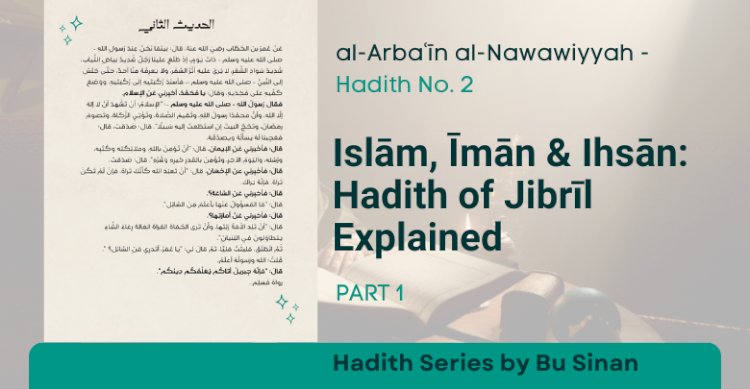


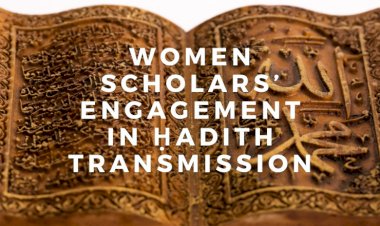

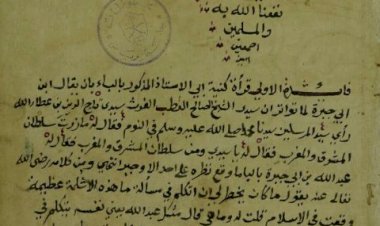


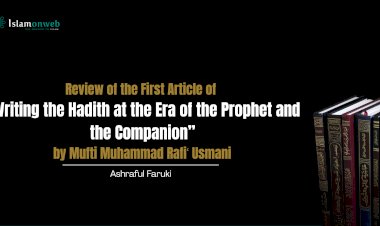














Leave A Comment